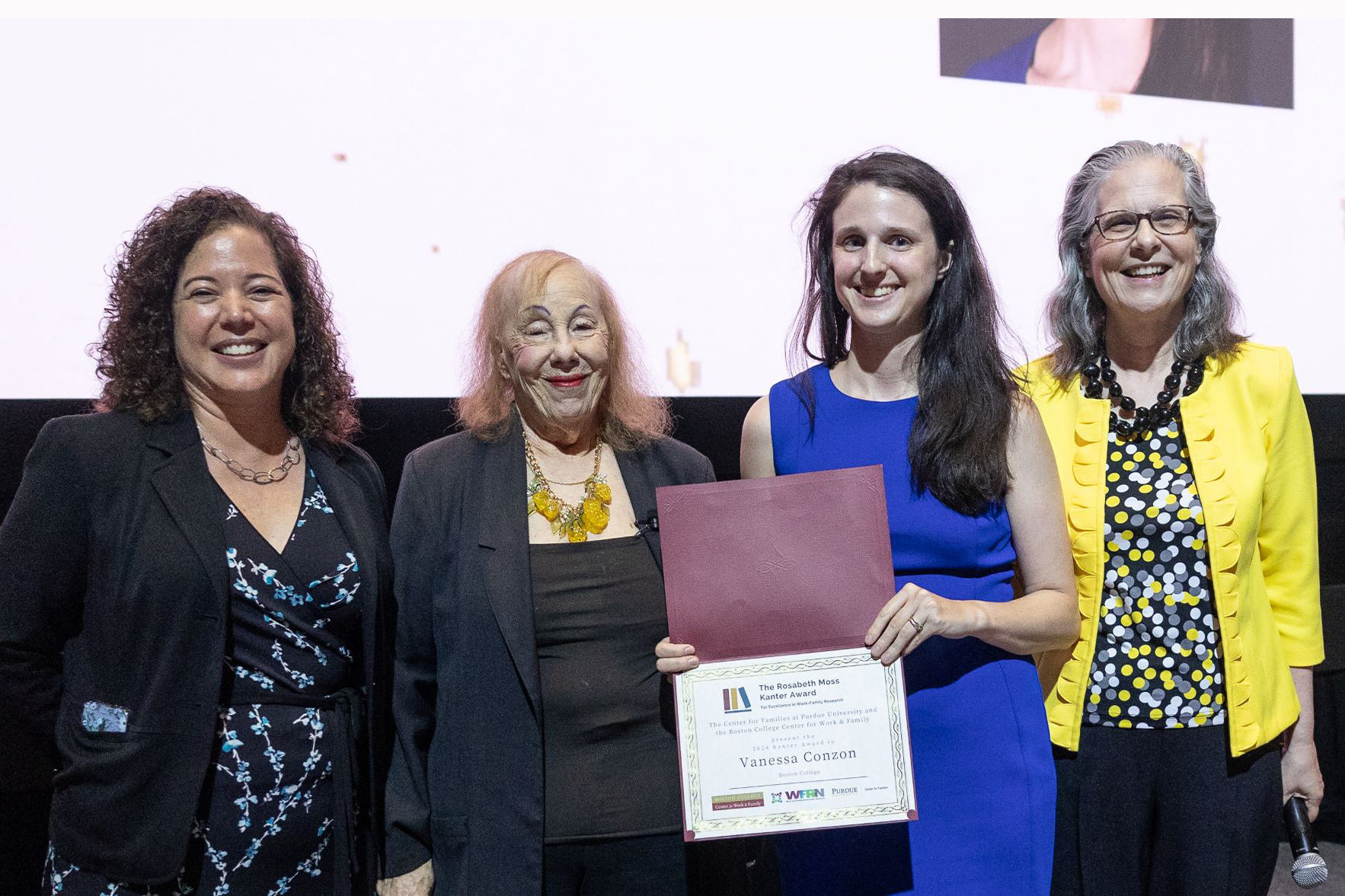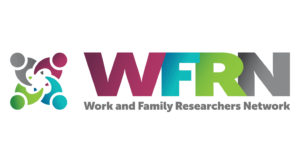The Rosabeth Moss Kanter Award for Excellence in Work-Family Research
Identifying the best-of-the-best research about work and family from around the globe.
Congratulations to the 2024 Kanter Award winners!

The equality policy paradox: Gender differences in how managers implement gender equality–related policies
Vanessa Conzon

Who’s remembering to buy the eggs? The meaning, measurement, and implications of invisible family load
Julie Wayne, Maura Mills, Yi‑Ren Wang, Russell Matthews, Marilyn Whitman
Journal of Business and PsychologyAbout the Kanter Award
There is a large and vibrant body of research on the relationships between work and non-work life. Researchers studying these issues come from many disciplines and professions, resulting in heterogeneous views and an interdisciplinary exchange of information, methods, theories, and insights. The integration of all these efforts, however, could be improved as could the exchange of information and insights among scholars, consultants and corporate practitioners. Institutions like the Work and Family Researchers Network, work-family journals, work-family centers at universities, non-profit work-family research foundations, and awards like the Kanter Award continue to foster the exchange of empirical, theoretical, and practical tools to advance the field. Achieving and maintaining theoretical integration, shared standards for research quality, and mutual awareness, however, remain an on-going challenge.
The Kanter Award is given to the authors who publish the best work-family research article during a calendar year (note that “family” is broadly defined). No external nominations are accepted for the award. Instead, every article published in a large number of scientific journals is scrutinized by a large committee of esteemed scholars who generate a list of award candidates.
Through the generous sponsorship of the Workforce Roundtable of the Boston College Center for Work & Family, the standards of quality for work-family research will continue to rise, and actionable findings from the best studies will become more commonplace in business communities to inform policy and best people practices.
Award Criteria
The basic criterion for selection of the Kanter nominees and winners is quality. For researchers, this means scientific rigor. What indicators of rigor do the nominated studies exemplify?
Strong connections to theory
By linking their ideas to theoretical schools of thought, the authors position their studies at the leading edge of existing knowledge. Their findings not only test their own hypotheses, but the propositions of entire theories. As the evidence for or against particular theories mounts, researchers can focus their energies on ideas with the greatest likelihood of being correct.
Large samples
In addition to being large, many of the samples are randomly selected and/or nationally representative. When not large, samples typically comprise hard-to-find or theoretically important groups.
Detailed data
Many of the studies use longitudinal data. The data sources are also diverse, such as policy analysis, time-use studies, in-depth interviews, or public records of organizational performance.
Creativity
Throughout the studies there are many examples of researchers developing creative solutions to research problems. A couple examples from past nominees include working around the problem of trying to develop a representative sample with limited resources and a pool of volunteer respondents (who usually aren’t representative) and using transition to retirement to reveal the dynamics of dividing household labor.
Award Procedures
Structure of the Review Committee
The committee is co-chaired by Jeremy Reynolds, professor of sociology at Purdue University; and Shelley MacDermid Wadsworth, distinguished professor at Purdue University. Using a variety of criteria, the committee chair invites reviewers to serve. For example, reviewers are selected to represent a variety of scientific fields and institutions. International representation is desirable. Each year, nominees and winners from the prior year are invited to serve on the committee. Volunteers are invited to join the committee via work-family networks and listservs. Both junior and advanced scholars are invited to serve, but most members are senior scholars with long publication records. Membership on the committee rotates on a staggered cycle of approximately three years.
Journals Reviewed
More than 60 leading English-language journals from around the world are typically reviewed for the Kanter competition. The selection of journals is guided using four sources: an empirical study by Bob Drago identifying where most of the work-family literature appears, the journals most frequently appearing in the citation database developed by the Sloan Work-Family Researchers’ Network, and an informal survey of leading researchers about the journals they regularly read. Members of the review panel are also surveyed each year about journals they recommend adding to the list.
Qualifying Articles
The Kanter award is given to the authors of the best work-family research article published during a calendar year. No external nominations are accepted for the award. Instead, every article published in a large number of peer-reviewed scientific journals is scrutinized. The articles must be based on data and innovative (i.e., not summaries of existing research). Both qualitative and quantitative analyses are eligible.
Initial Pool of Nominees
Each reviewer is responsible for examining all articles published during the calendar year in three to five scientific journals. Each journal is examined by at least two reviewers who nominate the articles they felt were written by deserving candidates for the Kanter award. Reviewers also are encouraged to nominate articles that they knew about through other sources.
Second Round
Each of the nominated articles is sent to three or four reviewers who score it according to several standard criteria. Total scores are used to select the top articles; the top five article authors become finalists for the award.
Final Round
In the final round, all reviewers score each article, and we also work with members of the National Workforce Roundtable, which is hosted the Boston College Center for Work and Family, to add human resources professionals representing some of the world’s leading employers and collectively more than 3 million employees, to the academic committee in reviewing the articles to identify which of the ‘best of the best’ studies has the greatest potential for impacting workplace practices. After the winners are chosen, reviewers are asked to recommend revisions to the award process for the following year.
About Rosabeth Moss Kanter
Rosabeth Moss Kanter is the Ernest L. Arbuckle Professor of Business Administration at Harvard Business School, specializing in strategy, innovation, and leadership for change. Her strategic and practical insights guide leaders worldwide through teaching, writing, and direct consultation to major corporations, governments, and start-up ventures. She co-founded the Harvard University-wide Advanced Leadership Initiative, guiding its planning from 2005 to its launch in 2008 and serving as Founding Chair and Director from 2008-2018 as it became a growing international model for a new stage of higher education preparing successful top leaders to apply their skills to national and global challenges. Author or co-author of 20 books, her latest book is Think Outside the Building: How Advanced Leaders Can Change the World One Smart Innovation at a Time.
The former chief Editor of Harvard Business Review, Professor Kanter has been repeatedly named to lists such as the “50 most powerful women in the world” (Times of London), and the “50 most influential business thinkers in the world” (Thinkers 50, and in November 2019 received their biannual Lifetime Achievement Award). She has received 24 honorary doctoral degrees, as well as numerous leadership awards, lifetime achievement awards, and prizes. These include Distinguished Career Awards from the Academy of Management and the American Sociological Association (Organizations, Occupations and Work Section); the World Teleport Association’s “Intelligent Community Visionary of the Year” award; the Pinnacle Award for Lifetime Achievement from the Greater Boston Chamber of Commerce; the International Leadership Award from the Association of Leadership Professionals; the Warren Bennis Award for Leadership Excellence; the Everett Rogers Innovation Award from the Norman Lear Center for media and society; and several Harvard Business Review McKinsey Awards for the years’ best articles. Other awards honor her thought leadership and community impact.
Before Think Outside the Building, her previous book, MOVE: Putting America’s Infrastructure Back in the Lead, a New York Times Editors’ Choice, is a sweeping look across industries and technologies shaping the future of mobility and the leadership required for transformation. Her book The Change Masters was named one of the most influential business books of the 20th century (Financial Times); SuperCorp: How Vanguard Companies Create Innovation, Profits, Growth, and Social Good, one of the ten best business books of the year by Amazon.com; Evolve! Succeeding in the Digital Culture of Tomorrow, one of the five best books of the year by the Toronto Star. Her book Confidence: How Winning & Losing Streaks Begin & End, a New York Times bestseller (also a #1 Business Week bestseller), describes the culture of high-performance organizations compared with those in decline and shows how to lead turnarounds, whether in businesses, schools, sports teams, or countries. Men & Women of the Corporation, winner of the C. Wright Mills award for the best book on social issues and often called a classic, offers insight into the individual and organizational factors that promote success or perpetuate disadvantage for women; a related video, A Tale of ‘O’: On Being Different, is a widely-used tool for diversity training. A related book, Work & Family in the United States, set a policy agenda, honored by a coalition of university centers creating in her honor the Rosabeth Moss Kanter Award for the best work/family research. Another award-winning book, When Giants Learn to Dance, shows how to master the new terms of competition at the dawn of the global information age. World Class: Thriving Locally in the Global Economy identifies the dilemmas of globalization for cities, a theme continuing in her book MOVE.
She advises numerous CEOs and senior executives through her consulting group and also serving as a Senior Advisor for IBM’s Global Citizenship portfolio from 1999-2012. She has served on many business and non-profit boards, such as City Year, the urban “Peace Corps” addressing the school dropout crisis through national service, and on commissions including the Governor’s Council of Economic Advisors, the U.S. Malcolm Baldrige National Quality Award, and others. She speaks widely, and has shared the platform with Presidents, Prime Ministers, and CEOs at major events, such as the World Economic Forum in Davos, Switzerland, and national industry conferences in over 20 countries. Before joining the Harvard Business School faculty, she held tenured professorships at Yale University and Brandeis University and was a Fellow at Harvard Law School, simultaneously holding a Guggenheim Fellowship. Her Ph.D. is from the University of Michigan.
SOURCE: Harvard Business School
Partnerships
The Rosabeth Moss Kanter Award for Excellence in Work-Family Research is a partnership of the Center for Families at Purdue University, the Center for Work and Family at Boston College, and the Boston College Center Workforce Roundtable, a group of leading organizations who sponsor the award.
The Center for Families at Purdue University
The Center for Families provides a way for faculty, staff, students, alumni, and friends of Purdue to help improve the quality of life for families. We serve as a catalyst to integrate outreach, teaching, and research activities that support families. We increase and enhance collaboration among academic disciplines, professionals, policymakers, corporations, and community organizations to bring about change focused on families. Find out more about the Center for Families.
Boston College Center for Work and Family
Founded in 1990, the Boston College Center for Work and Family is committed to enhancing the quality of life of today’s workforce by providing leadership for the integration of work and life, an essential for business and community success. We serve as a bridge between the worlds of academia and corporate practice, bringing together the world’s top scholars and thought leaders to influence organizational strategy and policy. Our learning and networking community, the Boston College Workforce Roundtable, brings together employers committed to excellence in work-life to shape responses to the demands of work, home, and community in order to enhance employee effectiveness.
The Work and Family Researchers Network
The new Work and Family Researchers Network (WFRN) is an international membership organization of interdisciplinary work and family researchers. The WFRN also welcomes the participation of policy makers and practitioners as it seeks to promote knowledge and understanding of work and family issues among the community of global stakeholders.


